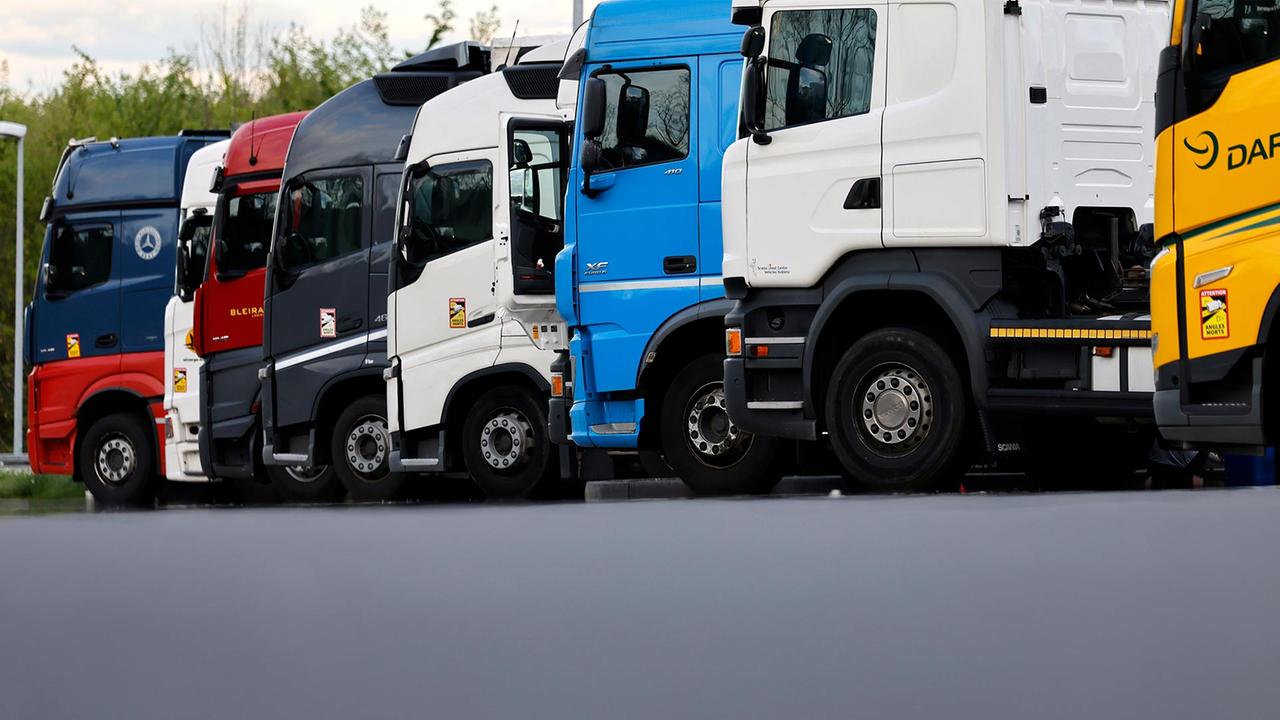background
They live in trucks, often spend months on the road for starvation wages and are usually helpless at the mercy of their bosses: truck drivers, especially from non-EU countries. Despite a strike in 2023, little has changed in their situation.
The strike by 150 Eastern European truckers in Gräfenhausen, Hesse, made national headlines last fall. The drivers from Uzbekistan, Georgia, Kazakhstan and Tajikistan complained that their Polish freight forwarder withheld their wages for months at a time. This makes it clear to many observers how bad the working conditions of drivers in the EU are.
In the end, the striking drivers get a large part of the money they demanded. But experts criticize that little has changed in the underlying system of exploitation since then. On the contrary. During a visit to a truck parking lot in Dortmund with the DGB Fair Mobility project, the Plusminus team met a truck driver from Belarus. He says he was recruited by a Lithuanian agency. He gets 75 euros a day – gross. He sleeps and lives in his truck almost all the time because financially there is no other option, he reports.
Right to Western European Minimum wages
Another driver comes from Ukraine and was hired by a Slovak agency. They, in turn, drive all over Germany for an Austrian shipping company. The driver receives the Slovakian minimum wage of around 700 to 900 euros, plus a few expenses, he says. According to Fair Mobility, drivers are entitled to a West German minimum wage. Affected: especially drivers from countries outside the EU.
Anna Weirich from Faire Mobility has been observing such conditions for years. “It's common practice. All truck drivers are paid this way. They also don't have the opportunity to switch to another employer because they don't exist,” she tells Plusminus. The advisory center team explains to drivers about their rights.
Drivers are actually supposed to return every eight weeks
It's not just about money, but also about a dignified private and family life, says social scientist Stefan Sell from Koblenz University. In his opinion, the important protective regulation of 'cabotage', according to which drivers should return to their homeland every eight weeks to recover, is often ignored. “In fact, we know from many reports that these drivers often spend months and even over a year juggling from one destination to another in Western Europe, which is actually not legally permissible.”
Drivers from Asia are now increasingly being used. They are even more at the mercy of the whims of their bosses, simply because of the distance. Dutch trade unionists recorded their interactions with them in a telephone recording – with wild insults and threats: “I'll break your neck, you motherfucker! In the Philippines you only get 100 euros. And now you come here and act like a hero! I'll come over and fi… your mother!”
Some agencies require money upfront
The Dutch trade unionist Edwin Atema has been fighting these injustices for years. Plusminus visits a truck stop in Bad Hersfeld in East Hesse with him. A driver from the Philippines tells him that he has been traveling non-stop in the EU for eight months and is afraid that the police will catch him because he doesn't have a residence permit. Two drivers from India say they got their job through a newspaper ad. They had to pay 4,000 euros to an agency in order to be able to come here. Now they get 1,700 euros per person per month and together they drive over 21 hours a day, they say.
Edwin Atema from the Dutch transport union FNV has clear words for this: “These companies are criminals. And it is also forbidden to make drivers pay before they do their job.”
Clear legal situation through the Supply Chain Act
The German supply chain law already prohibits all forms of slavery or forced labor and requires the payment of minimum wages. This also makes the shipping companies’ clients responsible.
The major shipper Amazon responds to our request: “We require all companies on this network to comply with our policies and all applicable laws and regulations, and we review compliance from time to time (…) If we determine that a If a company violates the regulations, we take immediate action.” IKEA Germany makes a similar statement and even threatens to stop deliveries if the law is violated.
Being right doesn't mean getting right
According to Anna Weirich from the DGB, there is always the enforcement problem. First of all, you need a driver who is prepared to demand and enforce his rights. Most of those affected accept the exploitation for a very simple reason, says labor market expert Stefan Sell. “If foreign truck drivers from other non-EU countries lose their jobs, then they will also lose their right to reside.”
The service union ver.di has also been fighting for improvements for years. She calls for a European minimum pay that is based on the highest minimum wage in the EU. “That would be 110.40 euros a day plus expenses, and everyone should get that,” says Tiny Hobbs from ver.di.
The federal government states that this can hardly be enforced at the EU level. So people in Germany will probably continue to be treated like slaves.




